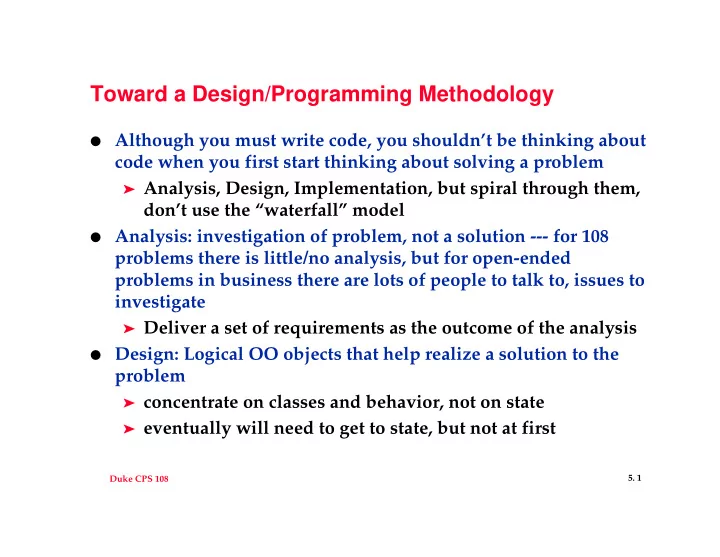

Toward a Design/Programming Methodology ● Although you must write code, you shouldn’t be thinking about code when you first start thinking about solving a problem ➤ Analysis, Design, Implementation, but spiral through them, don’t use the “waterfall” model ● Analysis: investigation of problem, not a solution --- for 108 problems there is little/no analysis, but for open-ended problems in business there are lots of people to talk to, issues to investigate ➤ Deliver a set of requirements as the outcome of the analysis ● Design: Logical OO objects that help realize a solution to the problem ➤ concentrate on classes and behavior, not on state ➤ eventually will need to get to state, but not at first 5. 1 Duke CPS 108
Use Cases: From Analysis to Design ● How will someone use the program? What are typical scenarios? ➤ Users have different roles, outside entities interact with the program, but also objects within the program interact with other objects ➤ Give scenarios a description and provide a paragraph that describes the user/system interactions ● Use cases/scenarios can be done formally or informally, but you need to think about how the system works ➤ From use case proceed to design of classes ➤ Nouns are classes, verbs are methods/member functions ➤ Brainstorm, throw things out, revisit analysis, get to state only at the end 5. 2 Duke CPS 108
Example: WOOFII in action ● How does user interact with system? Are there any issues in terms of user expectations of the system? Why? ➤ Fast or small? ➤ Possible additions to the system? ● Is it worth thinking about this from an OO viewpoint or is this main, two functions, and that’s it ➤ Suppose you have a class WordsInaFile , can this be used if specs change to do words in all files in a directory? • WordCollection vs. WordsInaFile • Operations on WordCollection objects? ● Should the readFile method sort objects? Why? Alternatives? 5. 3 Duke CPS 108
WOOFII classes (and maybe KWIC classes) ● Similarities/Differences ➤ Is a word a string? ➤ Time vs. space ➤ What about repeated words on a line in both programs ● Keep in mind ➤ Open/Closed principle, extend but don’t modify ➤ Coupling and Cohesion, each function/class captures one abstraction, minimal coupling between functions/classes ➤ Test each class outside of the main application ➤ Document design decisions as they happen rather than after the fact 5. 4 Duke CPS 108
C++ idioms ● Consider Date , DirStream , DirEntry , what happens with ➤ x = y; ➤ assignment is memberwise unless operator = overloaded ➤ copy constructor used in passing parameters by value ● If you need one of: destructor, assignment operator, copy constructor, you need all of them ➤ heuristic only: managing resources other than memory ➤ preventing objects from being copied ➤ what about non-copyable state, e.g., stream ● In assignment operator, watch for self-assignment 5. 5 Duke CPS 108
Assignment and C++ ● Copy constructor used to construct a variable that has never before existed ➤ no need to check self-assignment ➤ use initializer lists ➤ parameter is const-reference object, sometimes non-const needed as well ● Assignment operator gives new value to existing object ➤ check for self-assignment ➤ clean up old resources when allocating new ones ➤ Not used in Foo x = y; ● Both can be disabled by making methods private 5. 6 Duke CPS 108
Destructors in C++ ● Destructors clean up resources allocated by an object ➤ Objects/variables on the stack are destructed automatically when they go out of scope ➤ Objects allocated on the heap are destructed when the delete operator is called ● It’s nice not to worry about reclaiming storage, easy to get wrong delete p; //if p is NULL? Points to stack object? ➤ Java has automatic garbage collection, your C++ programs can have this too • commercial/free products • never delete anything, don’t implement destructors ● Who is responsible for deletion? ➤ Creator or benefactor? What about singleton? 5. 7 Duke CPS 108
The code doesn’t run ● Test classes in isolation, not as part of the complete program ➤ each class should (ideally) have its own test suite ➤ day.cpp, testday.cpp, wagreader.cpp, testwagreader.cpp,... ● Use the debugger: gdb, ddd ➤ debugger is much faster than edit/compile/debug ➤ important for pointers to find out where the problem is ➤ run, break at, where, step (into), next (statement) ● Never define a variable, especially a pointer, without giving it a value ● Ask questions of prof, TA, UTA, each other ● Post salient parts of problem, not “my code doesn’t work” 5. 8 Duke CPS 108
Recommend
More recommend